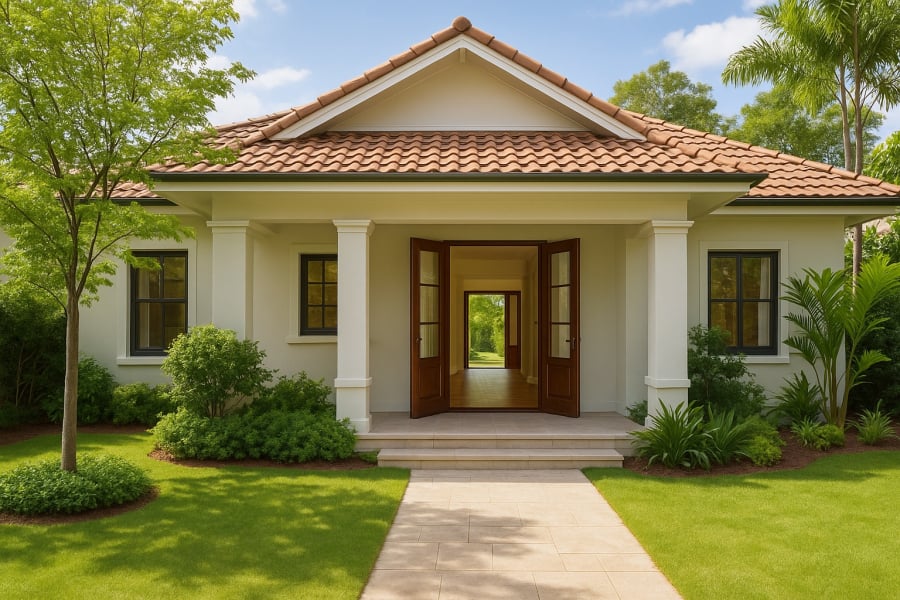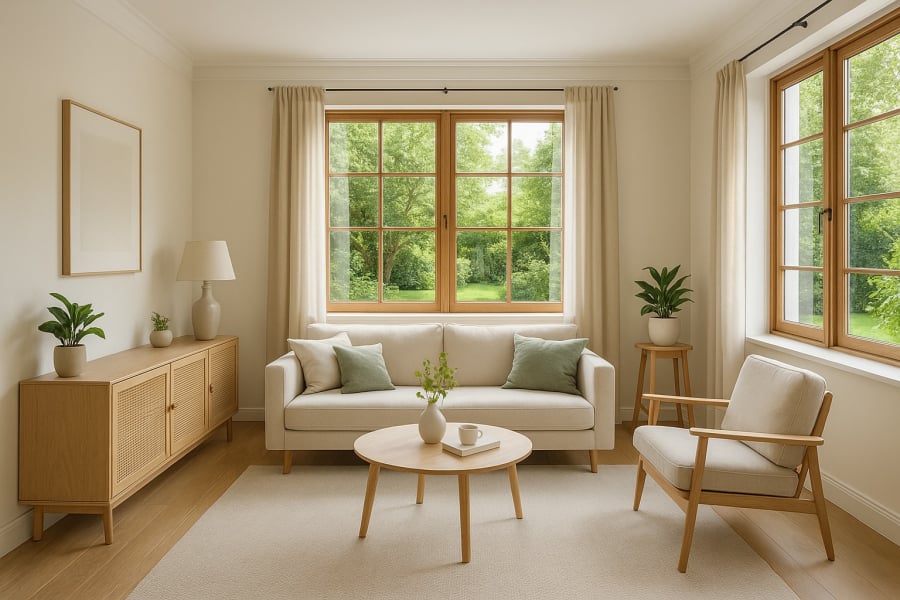House Height – The Little Detail with a Big Impact
You may not have given it much thought, but the height of your house is an important feng shui factor that directly influences the flow of energy and how it circulates within your living space.
According to traditional feng shui principles, a house that is too low can restrict the flow of energy, creating a sense of stuffiness and confinement. This can impact not only your physical health but also your mental well-being, leaving you feeling tense and drained of energy in your daily life and work.
The ideal height for a one-story house is between 3 and 3.5 meters, depending on the building area and the internal space arrangement. This height promotes better air circulation, creates a sense of spaciousness, and allows positive energy to flow freely, bringing good vibes to your entire family.

House and Main Door Direction – Welcoming Positive Energy
Feng shui places great importance on the direction of your house and the location of the main door, as this is where energy first enters your home. Choosing the right auspicious direction can open up a “golden path” for wealth and luck to flow into your house.
Homeowners should prioritize directions that align with their lifepath number – for example, individuals with an East Four Pillars lifepath number should choose the north, east, south, or southeast direction. Conversely, those with a West Four Pillars lifepath number are better suited to the west, southwest, northwest, or northeast directions.
Additionally, it’s crucial to avoid positioning the main door directly opposite a staircase, electrical pole, or a road that leads straight to the door. These configurations can invite negative energy into your home.
You can also place feng shui plants like money trees or peace lilies near the door or add a small fish tank to neutralize the energy flow and boost your wealth luck.
Neat and Logical Interior Design – Enhancing Harmony
Interior design goes beyond aesthetics; it plays a vital role in energy regulation within your home. In a one-story house, where space may be limited, a well-thought-out and spacious layout is essential.
- The living room should be the most spacious area, ideally located near the main door and decorated with bright colors like cream, white, or beige to create a visually expansive atmosphere.
- Avoid placing your bed directly opposite the door or under a crossbeam to prevent restless sleep and lethargy.
- Position your stove in a “sitting on the bad, facing the good” arrangement, meaning it should be placed in a bad feng shui sector but facing a good feng shui direction. This setup helps to dispel bad luck and attract good fortune.
Don’t forget the importance of lighting – maximize natural light during the day and use soft yellow lights at night to create a cozy and inviting ambiance.

Caring for Your Living Space – Small Efforts, Big Impact
A clean and green living space not only feels pleasant but also helps balance yin and yang energies in feng shui. Especially for one-story houses, which often feature gardens or backyards, maintaining lush greenery, a tidy yard, and simple landscaping like rockeries or small water features, is an excellent way to activate positive energy.
Hanging metal wind chimes at windows facing east or northwest is a popular feng shui tip. It stimulates the flow of positive energy and creates a soothing atmosphere whenever the wind blows.
In Conclusion: A Small House with Abundant Luck
We often focus on square footage and design, forgetting that it’s how we infuse our homes with our unique energy that determines whether our lives will be abundant and peaceful. Even with a modest one-story house, applying feng shui principles – from adjusting the height and choosing the right direction to arranging the interior wisely – can transform it into a vibrant home filled with positive energy, welcoming wealth and joy every day.
Sometimes, luck doesn’t come from grand gestures but from the small adjustments we make in our living spaces.
Disclaimer: This information is for reference only and is not intended as personal advice.





































